|
|
|
Sort Order |
|
|
|
Items / Page
|
|
|
|
|
|
|
| Srl | Item |
| 1 |
ID:
117185
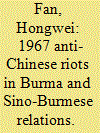

|
|
|
|
|
| Publication |
2012.
|
| Summary/Abstract |
Anti-Chinese riots broke out in Rangoon on 26 June 1967. The riots, which resulted from Chinese students' defiance of the Burmese government's ban on wearing Mao badges in school, led to the deterioration of Sino-Burmese relations, symbolised by the cessation of 'Pauk Phaw' ties and the subsequent shift in China's foreign policy which included open intervention in Burma's civil war. The riots contributed to estranged relations between Beijing and Rangoon throughout the 1970s and 1980s despite the normalisation of bilateral ties in 1970. While the roots of the Rangoon riots lay in Burma's political economy and tensions within the local Chinese community in the context of Cold War international relations, Beijing bore primary responsibility, however, due to its export of the Cultural Revolution.
|
|
|
|
|
|
|
|
|
|
|
|
|
|
|
|
| 2 |
ID:
157812
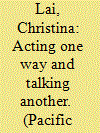

|
|
|
|
|
| Summary/Abstract |
Over the last two decades, China has experienced one of the most dramatic and sustained periods of economic growth in world history. China's use of economic statecraft provides an important venue in which to examine the role of unacknowledged ‘coercive diplomacy’ within the context of China's ‘peaceful rise discourse.’ In contrast to Western countries, which have overtly used sanctions and other forms of economic coercion, China has publicly denied any such policies while at the same time quietly pursuing them. China's denial of using coercive economic statecraft has muted the reactions of neighboring publics and government, but it cannot entirely forestall them. Without seriously undermining China's ‘peaceful-rising’ image, a more explicit statement from Beijing regarding its coercive economic measure could provide deterrence and assurance to China's neighbors in resolving the disputes. This article first surveys existing literature on economic statecraft focusing on the coercive aspects of such strategies. Second, it presents an in-depth case study on how China uses economic leverages over its neighbors in East Asia: North Korea, Japan, and the Philippines. Finally, it highlights the limits of China's economic statecraft within the constraints of China's ‘peaceful rise’ discourse. It concludes with implications for Asian politics and beyond.
|
|
|
|
|
|
|
|
|
|
|
|
|
|
|
|
| 3 |
ID:
137193
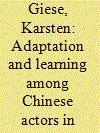

|
|
|
|
|
| Summary/Abstract |
Introduction to Journal of Current Chinese Affairs 1/2015: The Chinese Presence in Africa: A Learning Process
|
|
|
|
|
|
|
|
|
|
|
|
|
|
|
|
| 4 |
ID:
126774
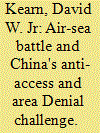

|
|
|
|
|
| Publication |
2013.
|
| Summary/Abstract |
The challenge presented by china's military modernization has seemingly altered the conventional balance in the western pacific, with significant implications for U.S. national security policy, and, thus, deserves the focus of planners and decision-makers.
|
|
|
|
|
|
|
|
|
|
|
|
|
|
|
|
| 5 |
ID:
164373
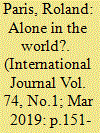

|
|
|
|
|
| Summary/Abstract |
Canada has found itself in serious diplomatic disputes over the past year with Saudi Arabia and China. The Saudis took issue with the Canadian foreign minister’s call to release human rights activists from prison, whereas China was angry at Canada’s arrest of a senior Chinese executive on an extradition request from the United States. These incidents should not be viewed as isolated aberrations. Authoritarian regimes seem increasingly emboldened to lash out at countries that displease them, including allies of the United States. But Ottawa has succeeded in rallying considerable international support for its position in the China dispute, suggesting that while Canada may be exposed, it is not destined to be alone
|
|
|
|
|
|
|
|
|
|
|
|
|
|
|
|
| 6 |
ID:
136741
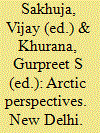

|
|
|
|
|
| Publication |
New Delhi, National Maritime Foundation, 2015.
|
| Description |
v, 79p.Pbk
|
| Standard Number |
9788193015926
|
|
|
|
|
|
|
|
|
|
|
|
Copies: C:2/I:0,R:0,Q:0
Circulation
| Accession# | Call# | Current Location | Status | Policy | Location |
| 058118 | 327.1632/SAK 058118 | Main | On Shelf | General | |
| 058152 | 327.1632/SAK 058152 | Main | On Shelf | General | |
|
|
|
|
| 7 |
ID:
132308
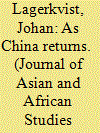

|
|
|
|
|
| Publication |
2014.
|
| Summary/Abstract |
This article investigates how perceptions of China in Mozambican civil society are affected by entrepreneurial activity and bilateral cooperation between China and Mozambique - real, imagined, visible and legal as well as clandestine and illegal in the agricultural and forestry sectors. The research problem concerns how discourse on Chinese investors is formed in Mozambique. Two questions are posed. How does Mozambican civil society perceive their room to maneuver at a time of Chinese growing economic interest and 'return' to Africa? What views exist on the policy space for the national government? Using qualitative ethnographic interviews to answer these overarching questions about expanding/contracting maneuvering space, this article explains how Mozambique's largest social group - peasants - the National Association of Small Farmers (UNAC) and other societal actors perceive Chinese investors. Informed by theoretical debates on civil society, the article argues that coinciding with China's large-scale return to Africa, an already tense dynamic between civil society and the state is picking up speed. It is argued that this phenomenon is likely to have more to do with African governments accruing more power and policy space than through direct impact of Chinese economic activity on African social life. However, to avoid negative discourse formation, China and host governments need to become more open on and transparent about bilateral agreements.
|
|
|
|
|
|
|
|
|
|
|
|
|
|
|
|
| 8 |
ID:
166012
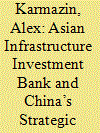

|
|
|
|
|
| Summary/Abstract |
Creating the Asian Infrastructure Investment Bank (AIIB), a multilateral development bank initiated by the People’s Republic of China, has been one of the key symptoms of Xi Jinping’s ambitious “China Dream” foreign policy. The previous studies mainly focused on providing a description of AIIB’s creation or general motives and context through which they explicated the establishment of the Bank. Building on the literature focused on strategic culture and grand strategy, I supplement the general motives of AIIB’s creation by characterizing the style and process of AIIB’s materialization. I argue that the style (procedure) of AIIB’s implementation largely resembles the previous Dengian model of strategic procedure which Deng himself described with the Chinese saying “crossing the river by touching the stones” which evinces flexibility and “step-by-step” characteristics in its procedure. This helps to illustrate that China’s engagement with the international order can be adaptive to a significant degree and China does not necessarily follow a pre-planned vision of how to take over international (institutional) order. While China’s foreign policy in some areas is often regarded as being assertive and rigidly defending its positions, AIIB is a different case to a high extent. Moreover, analyzing the creation of AIIB indicates ambiguity of Xi’s foreign policy regarding general aims it wants to achieve and identities on which it should be based.
|
|
|
|
|
|
|
|
|
|
|
|
|
|
|
|
| 9 |
ID:
131993
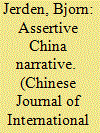

|
|
|
|
|
| Publication |
2014.
|
| Summary/Abstract |
Dissenting assaults on the conventional wisdom that China's foreign policy became more 'assertive' in 2009-2010 have intensified. In this article I develop this revisionist critique in three ways. First, to make the most valid and cumulative assessment of the accuracy of the 'assertive China narrative' to date, I conceptualise its key empirical claim as a case of the general phenomenon of 'foreign policy change'. Second, based on this framework, I present a range of new empirical evidence that, taken as a whole, strongly challenges the notion of a new Chinese assertiveness. Third, since academic China and Asia experts played a pivotal role in creating the narrative, I raise a comprehensive explanation of why a great many scholars so strikingly went along with the flawed idea.
|
|
|
|
|
|
|
|
|
|
|
|
|
|
|
|
| 10 |
ID:
111636
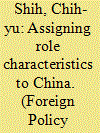

|
|
|
|
|
| Publication |
2012.
|
| Summary/Abstract |
This paper distinguishes and integrates national identity and national image through a deep role analysis. It argues that the meaning of China's rising rests upon the views of those who evaluate China's role playing. This role analysis mediates between international relations and Chinese foreign policy. It also mediates between China watchers and their China. The two dimensions of role-role taking and role making-generate four different discursive approaches to interpreting the rise of China, each in its own way associated with the affects of opportunity and threat. They are "nation state,""civilization,""Tianxia," and "Asianism." In response to the external view on the rise of China, Chinese narrators often take the Tianxia and nation state approaches as components of their conception of national role. These conceptions mediated by role-making and role-taking, evolve into four possible strategic focuses-national interests, imperialism, sovereignty and center-periphery. While this last strategic focus on role-taking has recently attracted enthusiastic response in China, it has been re-appropriated by social science concepts such as soft power and social capital that assume an egoistic role-making China is on the move.
|
|
|
|
|
|
|
|
|
|
|
|
|
|
|
|
| 11 |
ID:
129535
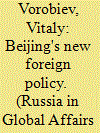

|
|
|
|
|
| Publication |
2014.
|
| Summary/Abstract |
All players expect explanation from China of its initiative to build a New Economic Silk Road. The faster it presents arguments and the clearer they are, the less room there will be for idle speculation and rumor. In any case, China is interested in a favorable response and support for its own foreign policy signals. Chinese leader Xi Jinping first came up with the idea of creating a Silk Road economic space as foreign policy priority for the current, fifth generation of national leaders during a visit in September 2013 to Kazakhstan. In view of the crucial and long-term character of his intention, it is in Russia's interests, as a European and Pacific power and as China's neighbor and long-term bilateral strategic partner, to take a closer look at what content China is putting into this newly conceived project and how the Asian power plans to implement it.
|
|
|
|
|
|
|
|
|
|
|
|
|
|
|
|
| 12 |
ID:
120151


|
|
|
|
|
| Publication |
2013.
|
| Summary/Abstract |
Why and how can historical cases support different assessments of China rising with respect to the possibility of its becoming China threat? Rationalists and strategic culture analysts, who predominantly look at China from an external position, debate the influence of power, strategic cultures, and identities in explaining this highly controversial question. We, however, develop an internal view from the standpoint of a China looking out, which argues that different sources of Chinese self-role concepts could yield different policy behaviour. We analyse two discourses on Chinese foreign policy that have emerged in the 21st century-core national interest and harmonious world. We then introduce the dialectic approach of harmonious realism wherein indecisiveness is the essential characteristic. It is failure to decide on the specific purpose of Chinese foreign policy that creates China's self-role conflict. Harmonious disciplining, balance, racism, and intervention are the practical forms of China's harmonious realism through which the contemporary case analysis explains the forms, actual policy, and behavioural consequences of China's self-role conflict.
|
|
|
|
|
|
|
|
|
|
|
|
|
|
|
|
| 13 |
ID:
091578
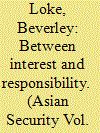

|
|
|
|
|
| Publication |
2009.
|
| Summary/Abstract |
This article is situated within the contemporary debates about the nature and purpose of China's growing power. It uses the concepts of "national interest" and "international responsibility" as a framework of analysis for Chinese foreign policy, and develops a three-dimensional typology to conceptualize their relationship (antagonistic; instrumental; mutually constitutive). This article adopts two main arguments. First, a stronger China is one gravitating toward greater notions of international responsibility, albeit instrumentally. Second, observable trends in China's evolving worldview indicate, however, that it is conceiving its national interests more broadly, embracing further socialization and greater normative commitments to international society. One may therefore view China's burgeoning global role as a great power with a degree of "cautious optimism."
|
|
|
|
|
|
|
|
|
|
|
|
|
|
|
|
| 14 |
ID:
117967
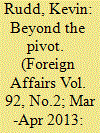

|
|
|
|
|
| Publication |
2013.
|
| Summary/Abstract |
Debate about the future of U.S.-Chinese relations is currently being driven by a more assertive Chinese foreign and security policy over the last decade, the region's reaction to this, and Washington's response -- the "pivot," or "rebalance," to Asia. The Obama administration's renewed focus on the strategic significance of Asia has been entirely appropriate. Without such a move, there was a danger that China, with its hard-line, realist view of international relations, would conclude that an economically exhausted United States was losing its staying power in the Pacific. But now that it is clear that the United States will remain in Asia for the long haul, the time has come for both Washington and Beijing to take stock, look ahead, and reach some long-term conclusions as to what sort of world they want to see beyond the barricades.
|
|
|
|
|
|
|
|
|
|
|
|
|
|
|
|
| 15 |
ID:
178214
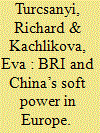

|
|
|
|
|
| Summary/Abstract |
The article aims to contribute to our understanding of China’s soft power in Europe and the impact of the Belt and Road Initiative (BRI) in this regard. We conduct analyses of two leading newspapers in the United Kingdom, in Spain, and in Poland to discover how the BRI was framed there in the period from mid-2013 to mid-2017. The empirical results show that the media reported about the initiative quite positively – especially compared to the general media picture of China in Europe – and to a considerable extent followed Chinese narratives of economic opportunities while overlooking geopolitical and security worries. Theories of “journalistic routines” and linguistic “affective sticking points” will be suggested as possible explanations of these dynamics, highlighting both the fact that Chinese narratives outnumbered European ones in the initial period quantitatively, and were able to offer something that resonated with the audience qualitatively.
|
|
|
|
|
|
|
|
|
|
|
|
|
|
|
|
| 16 |
ID:
128315
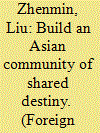

|
|
|
|
|
| Publication |
2013.
|
| Summary/Abstract |
As a member of Asia, China's development is rooted in Asia, and Asia has always been a priority on China's diplomatic agenda. China's growth has benefited from a peaceful neighboring area and, in turn, promoted stability and prosperity in Asia. At the same time, China and its neighbors are faced with both historic opportunities and challenges in development. Since the new government in China took office in 2013, China and other Asian countries have had frequent high-level exchanges and stronger cooperation in the field of economy and trade. China actively upholds peace and stability in the region and is working with other Asian countries to build a bright future for an Asian community of shared destiny.
|
|
|
|
|
|
|
|
|
|
|
|
|
|
|
|
| 17 |
ID:
149800
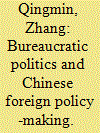

|
|
|
|
|
| Summary/Abstract |
This article tries to bridge the bureaucratic politics model of foreign policy analysis (FPA), which is based on American foreign policy practice, and Chinese foreign policy studies. It traces the development and discusses the Chinese features of the bureaucratic politics model, and analyses the evolving bureaucratic political process of Chinese foreign policy-making. Its conclusion is that the foreign policy-making process of the People’s Republic of China (PRC) has progressed from ideology-based ‘line battles’ to personal relationship (guanxi)-based in-party competition, and from factional competition under one paramount leader to government politics wherein many participants vie for different policies. As China integrates more deeply into the international community, and communist ideology loses its political validity in Chinese politics, bureaucratic politics in China exhibits more prominent Chinese cultural features, and at the same time shares greater similarities with the bureaucratic politics in western democratic countries. Therefore, to avoid rigidity, attention must be paid to variances in bureaucratic politics as applied in the Chinese context. Bridging FPA theory and Chinese foreign studies is hence both viable and beneficial for the construction of FPA theories beyond the United States and for China’s foreign policy research.
|
|
|
|
|
|
|
|
|
|
|
|
|
|
|
|
| 18 |
ID:
121757
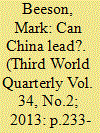

|
|
|
|
|
| Publication |
2013.
|
| Summary/Abstract |
The 'rise of China' is proving to be one of the most consequential developments of the early 21 century One of the key questions it raises is about the impact this historically unprecedented process will have on the East Asian region in particular and the world more generally. Will Chinese policy makers will be able to translate the country's growing material importance into other forms of political power and influence? Equally importantly, will Chinese elites be 'socialised' into the practices and norms of extant institutions, or will they attempt to redefine them to further Chinese foreign policy goals? This paper explores these questions by initially looking at the overall historical context in which East Asian regionalisation has occurred, before considering the operation of some of the more important regional institutions. It is suggested that China's ability to offer regional leadership is constrained both by its own security policies?which are seen as increasingly threatening by many of its neighbours?and by the actions of the USA, which is trying to reassert its own claims to regional leadership. While the outcome of this process is inconclusive, it helps us to understand the more general dynamics reshaping the international system as a result of the emergence of new centres of international power.
|
|
|
|
|
|
|
|
|
|
|
|
|
|
|
|
| 19 |
ID:
165655


|
|
|
|
|
| Summary/Abstract |
What factors account for the increasingly erratic U.S. policy towards China, marked by growing domestic divisions and tensions over means and ends? Can the United States contain China, as called for by its military leaders and a growing segment of corporate America? Or, can the Sino-American rivalry be managed peacefully and without plunging the world into depression? The preoccupation with rhetoric and agency in the analysis of U.S. foreign policy overlooks the role of social forces and class interests. The confusion and vacillation in U.S. trade policy are amplified by the manifest dysfunctions of the Trump administration, but they ultimately reflect a deeper, double logic, expressing not only the “Thucydides trap” in which a declining but still formidable hegemon contemplates submission to a rising power but also a crisis of neoliberalism.
|
|
|
|
|
|
|
|
|
|
|
|
|
|
|
|
| 20 |
ID:
152033
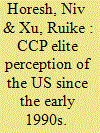

|
|
|
|
|
| Summary/Abstract |
This article juxtaposes two of the most influential yet under-studied America watchers within the top echelon of the Chinese Communist Party (CCP), Wang Huning and Zheng Bijian. To be sure, the two have indelibly shaped CCP attitudes, yet surprisingly enough, although Zheng has been written about extensively in the English language, Wang has hitherto largely remained outside academics’ purview. This article also aims, in passing, to explore linkages between Wang and Zheng ideas and those of other well- known America watchers like Liu Mingfu and Yan Xuetong. The comparison offers clues as to the extent to which the current advisory shaping CCP thinking on the US differs from the previous generation, and as to whether CCP thinking is un-American or anti-American in essence. The conclusions ties the study together by arguing, based on Wang and Zheng's views, that New Confucianism may shape Chinese society in the future
|
|
|
|
|
|
|
|
|
|
|
|
|
|
|
|
|
|
|
|
|